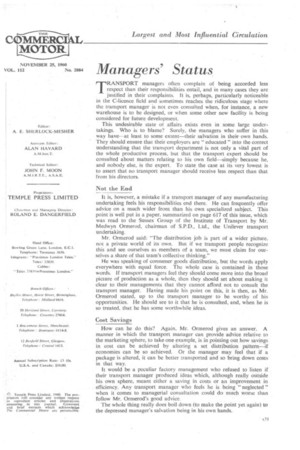Managers' Status
Page 33

If you've noticed an error in this article please click here to report it so we can fix it.
TRANSPORT managers often complain of being accorded less respect than their responsibilities entail, and in many cases they are justified in their complaints. It is, perhaps, particularly noticeable in the C-licence field and sometimes teaches the ridiculous stage where the transport manager is not even consulted when, for instance, a new warehouse is to be designed, or when some other new facility is being considered for future development.
This undesirable state of affairs exists even in some large undertakings. Who is to blame? Surely, the managers who suffer in this way have—at least to some extent—their salvation in theirown hands. They should ensure that their employers are " educated " into the correct understanding that the transport department is not only a vital part of the whole productive process, but that the transport expert should be consulted about matters relating to his own field—simply because he, and nobody else, is the expert. To state the case at its very lowest is to assert that no transport manager should receive less respect than that from his directors.
Not the End • It is, however, a mistake if a transport manager of any manufacturing undertaking feels his responsibilities end there. He can frequently offer advice on a much wider front than his own specialized subject. This point is well put in a paper. summarized on page 617 of this issue, which was read to the Sussex Group of the Institute of Transport by Mr. Medwyn Ormerod, chairman of S.P.D., Ltd., the Unilever transport undertaking.
Mr. Ormerod said: "The distribution job is part of a wider picture, not a private world of its own. But if we transport people recognize this and see ourselves as members of a team, we must claim for ourselves a share of that team's collective thinking."
He was speaking of consumer goods distribution, but the words apply everywhere with equal force. The whole case is contained in those words. If transport managers feel they should come more into the broad picture of production as a whole, then they should set about making it clear to their managements that they cannot afford not to consult the transport manager. Having made his point on this, it is then, as Mr. Ormerod stated, up to the transport manager to be worthy of his opportunities. He should see to it that he is consulted, and, when he is so treated, that he has some worthwhile ideas.
Cost Savings
How can he do this? Again, Mr. Ormerod gives an answer. A manner in which the transport manager can provide advice relative to the marketing sphere, to take one example, is in pointing out how savings in cost can be achieved by altering a set distribution pattern—if economies can be so achieved. Or the manager may feel that if a package is altered, it can be better transported and so bring down costs in that way.
U would be a peculiar factory management who refused to listen if, their transport manager produced ideas which, although really outside his own sphere, meant either a saving in costs or an improvement in efficiency, Any transport manager who feels he is ,being " neglected " when it comes to managerial consultation could do much worse than follow Mr. Ormerod's good advice.
The whole thing really does boil down (to make the point yet again) to the depressed manager's salvation being in his own hands.




















































































































